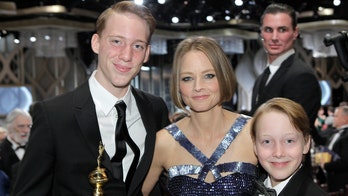As hobbies go, laboriously transforming ostrich eggs into one-of-a-kind handbags using dentists' drills, a finicky epoxy resin and minuscule Swarovski crystals doesn't necessarily sound like the most appealing choice.
Not unless you're married to the "Chicken Man," that is.
It proved the perfect pastime for Mitzi Perdue, the third wife of the late poultry magnate Frank Perdue, of the iconic "It takes a tough man to make a tender chicken" TV commercial fame.
Over the past 18 years, the striking blond estimates she's fashioned more than of the 500 elaborate handbags out of hollowed-out shells.
Bedazzled with pearls or draped with delicate chains, sparkling with rhinestones or painted with pastoral scenes, Perdue's creations are like wearable Faberge eggs. There's just one difference: Unlike the legendary Imperial Easter eggs -- fanciful concoctions of gold and diamonds made in the late 19th century by jeweler Peter Carl Faberge for the Russian czar --
Perdue's so-called EveningEggs are made not out of precious metals but from calcium carbonate, the main ingredient in shells.
Perdue stumbled onto the pastime by accident, after a 1993 car wreck that ruptured a disc and left her bedridden for months.
After reading her way through her backlog of books and absorbing more than her lifetime dose of daytime television, Perdue was desperately seeking diversion. Inspired by a how-to arts show on PBS, she decided to overcome her "utter lack of artistic ability" and try her bored hand at painting.
"And then I thought, `as long as I'm going to paint, why not do it on an egg instead of a flat old piece of cardboard?"' said Perdue, in a telephone interview from her apartment on Manhattan's tony Fifth Avenue. "After all, if Frank was the `Chicken Man,' why shouldn't I be the `Egg Lady?"'
Before becoming the "Egg Lady," Perdue had cycled through a whole series of iterations. The daughter of Sheraton hotel chain co-founder Ernest Henderson, Harvard-educated Perdue had previously been a California rice farmer, a newspaper columnist and star of her own syndicated television show, called "Mitzi's Country Magazine," among other things.
But all that changed when she met the man widely credited with industrializing the poultry business: Frank Perdue, a Maryland-born farm boy who turned his parents' chicken ranch into a multibillion dollar operation of global reach and whose folksy, straight-talking appearances on Perdue Farms' TV commercials made him a household name, as well as helping launch a thousand chicken casseroles.
The two met in 1988, after their respective divorces -- Mitzi's first, the second for Frank, who was 21 years her senior.
"We decided to get married about five minutes after meeting," she said. And they did, just five months after that first electric encounter.
Perdue kept herself busy throughout their 17-year-long union by organizing weekly get-togethers with company's employees.She estimates they hosted at least 10,000 workers -- half Perdue Farms' work force -- at their Salisbury, Md., home.
But it wasn't till she become the "Egg Lady" that she really hit her stride.
Perdue started out decorating chicken eggs, before moving on to bigger goose and then jumbo ostrich eggs, which she sourced from a Texas-based ostrich meat farmer for $12 a piece.
"I tried to convince Frank to get into the ostrich business so I could have a free supply of eggs, but the math didn't really add up: On the one hand, $12 for an egg versus $2 million to set up a business," she said with a laugh. "Let's just say, I'm still getting them from Texas."
Perdue uses a dentist's drill to slice off the top of the egg, oeuf a la coque-style . Many a good egg was ruined as she learned how to handle the tool, with a blade that turns at a menacing 450,000 rotations per minute.
Once the insides are scooped out, she covers both the shell's inside and outside with a two-part resin. That, too, took a fair share of experimenting. Perdue said she tried at least 40 different formulas before finding one that goes on smoothly and dries rock-hard.
"I think you could shoot one of my eggs out of a cannon and injure someone and it wouldn't break," she said. When asked to identify the miracle resin, Perdue demurred -- she wouldn't want to make it too easy for potential copycats -- saying only that it's available on the market.
After upholstering the inside in plush velvet or silk and bedazzling the outside with pearls and glinting rhinestones, she attaches a shoulder strap and fits the sliced-off top back on with custom-made, gold-plated hinges.
Despite her years of experience, it remains a painstaking process. It takes at least 30 hours worth of eye-straining labor to make even the simplest EveningEgg, and the more elaborate models can take much longer.
She also makes elaborate dioramas, which she dubbed EggScapes. (Both names are trademarked.)
Perdue donates many of her creations to her non-profits of choice, and they've fetched from $1,200-$12,000 at charity auctions.
Though her output slowed from several dozen to just a handful of eggs a year following the Frank Perdue's 2005 death and her subsequent move to New York City, Perdue said she hopes to ramp up production soon.
She's moving back to Maryland to be close to her grandchildren this fall and hopes to pump out enough EveningEggs to start selling them.
Wallflowers be warned: Perdue's egg-cessories are attention grabbers, guaranteed to be the center of attention at even the chicest cocktail party.






